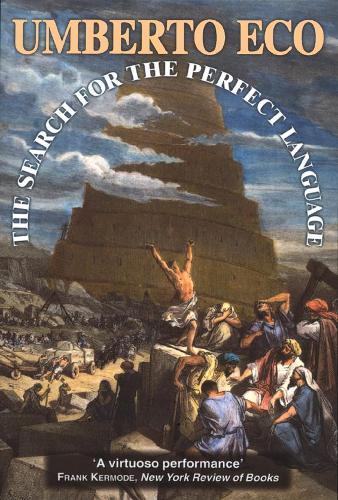Overview
From the early Dark Ages to the Renaissance it was widely believed that the language spoken in the Garden of Eden was a perfect language, expressing all possible things, and that all current languages were its decadent descendants. This is an investigation into the history of this idea.
Full Product Details
Author: Umberto Eco ,
James Fentress
Publisher: HarperCollins Publishers
Imprint: Fontana Press
Dimensions:
Width: 12.90cm
, Height: 2.50cm
, Length: 19.80cm
Weight: 0.280kg
ISBN: 9780006863786
ISBN 10: 0006863787
Pages: 400
Publication Date: 10 July 1997
Audience:
College/higher education
,
Professional and scholarly
,
Undergraduate
,
Postgraduate, Research & Scholarly
Format: Paperback
Publisher's Status: Active
Availability: Manufactured on demand

We will order this item for you from a manufactured on demand supplier.
Reviews
"""This is as much a history of the study of language and its origins as it is a"" tour de force"" pursuit using scholarly detection and cultural interpretation, thus providing a series of original perspectives on two thousand years of European history."" "" The Medieval Review"""
This dense archival study finds philosopher/novelist/essayist Eco (Semiotics/Univ. of Bologna, Italy; Foucault's Pendulum, 1989, etc.) excavating the labyrinthine history of early modern European linguistics. Eco traces how the desire to find - or, failing that, to forge - the ideal language motivated a series of philosophers to develop some of our most fundamental structures of thought. One line of descent begins with the Jewish Kabbalism of the Middle Ages. Kabbalistic practices of interpreting Torah by working out anagrams and other linguistic combinations inspired a host of philosophers. One key figure was Raymond Lull, a Christian mystic who sought to produce a new evangelical language. While Lull failed, his efforts influenced not only the magic languages of such occult figures as Jonathan Dee, Queen Elizabeth's astrologer, but also the scientific logic and encyclopedism of Enlightenment giants like Leibniz. Eco also traces how the search for the perfect language gave rise to linguistic ideas of history and national identity. Various thinkers sought to recapture the first language, some speculating on the secrets of the Garden of Eden, others attempting to decipher Egyptian hieroglyphs. Authors such as Dante, in contrast, sought to legitimate their national vernaculars as potentially perfect. From these roots developed the scientifically modern but ethically hazardous project of tracing etymologies back to a common Indo-European, or Aryan, ur-language. A few purple passages aside, Eco focuses on complete coverage rather than on imaginative recreation. Thus, while the text is readable, even intriguing in places, the general reader perusing this volume should anticipate some tough going. The Tower of Babel; Leibniz's passion for universal peace ; Renaissance espionage techniques; the 20th century project of Esperanto: Eco has intriguing subject matter to work with here. But some of the material is so leaden, even Eco's magical wit can't turn it all to gold. (Kirkus Reviews)
An investigation of the tantalizing idea that there once existed a language which perfectly and unambiguously expressed the essence of all possible things. Eco explores the writings of Augustine, Dante, Descartes and Rousseau together with early treatises on cabbalism and magic in his investigation into this corner of linguistic history. (Kirkus UK)
This is as much a history of the study of language and its origins as it is a tour de force pursuit using scholarly detection and cultural interpretation, thus providing a series of original perspectives on two thousand years of European history. The Medieval Review
Author Information
Umberto Eco was born in Alessandria in 1932 and has been Professor of Semiotics at the University of Bologna since 1975 and President of the International Centre for Semiotic and Cognitive Studies since 1988. His books include The Name of the Rose (1980) and Foucault's Pendulum (1988). His most recent works include Semiotics and the Philosophy of Language (1984), The Limits of Interpretation (1990), Apocalyspe Postponed (1994) and The Island of the Day Before (1995).




